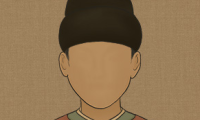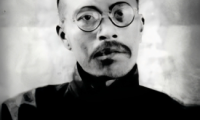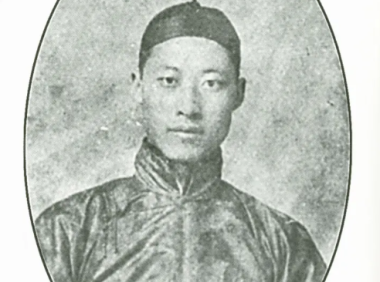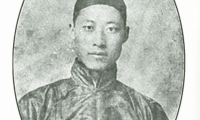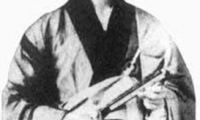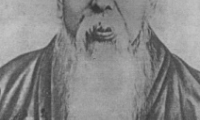-
Wang Yuanding: The Cold Food Day
醉太平·寒食其三 王元鼎 辜负了禁烟。 冷落了秋千。 春光去也怎留恋? 听莺啼燕喧, 红馥馥落尽桃花片。 青丝丝舞困垂杨线, 扑簌簌满地坠榆钱, 芳心堕倦。 The Cold Food Day To the Tune of Intoxication in Peace Wang Yuanding Wasting the golden chance of banning cooking, Abusing the jolly time of having a swing. Having no way to make the prime of spring lingering, I have to listen to orioles and swallow’s twittering. No peach blossoms blooming but the pink petals whirling, The slender willow twigs are growing weary of dancing, Streaming down in breeze are elm seeds everywhere rustling. Sitting in the room alone I’m wearing. (周方珠 译)...
- 0
- 0
- 86
-
Wang Yuanding: Tune: Drunk in Time of Peace
醉太平·寒食其二 王元鼎 声声啼乳鸦, 生叫破韶华, 夜深微雨润堤沙, 香风万家。 画楼洗净鸳鸯瓦, 彩绳半湿秋千架。 觉来红日上窗纱, 听街头卖杏花。 Tune: Drunk in Time of Peace Cold Food Day Wang Yuanding Nursling crows caw out cry on cry, Breaking the early day of spring. Last night the drizzle moistened the sand far and nigh, Thousands of homes sweetened by the breeze on the wing. The lovebirds tiles of painted house are washed clean, The colored ropes of the swing wet before the bower. I wake to find the sun redden the window screen And hear the street cry of selling apricot flower. (许渊冲 译) Ode on Cold Festival1 to the tune of Tipsy in a Peaceful Time Wang Yuanding Incessantly the young ravens call in chime That break suddenly the fair spring time. Drizzle at deep night dampens the dam and sand, In the fragrance of wind myriad houses stand. Paired tiles on the painted tower are washed clean, Slightly wet is the colour ropes of the swings, Awake, one finds the red sun shining on the window screen, In ears the call of the seller of apricot flowers rings. the traditional Chinese festival, celebrated on the day before Qingming when people eat cold food only. (辜正坤 译)...
- 0
- 0
- 61
-
Qiu Jin: The Azalea
杜鹃花 秋瑾 杜鹃花发杜鹃啼,似血如朱一抹齐。 应是留春留不住,夜深风露也寒凄。 The Azalea Qiu Jin The azaleas turning red, cuckoos are to sing, Either blood or red is like the same thing. We have no way to have kept spring stay, At midnight the windy dews drop coldly. (朱曼华 译)...
- 0
- 0
- 86
-
Wang Guowei: Tune: “Echoing Heaven’s Everlastingness” ~ 《浣溪沙》 王国维 with English Translations
In modern Western literature and art, there are so-called symbolists, and Mr. Jing'an's works are close to them; this poem should belong to the "state of no self" as the highest level of poetry; the meaning of the words is unique and elegant, and a little is better than… a lot. 近代西洋文艺有所谓象征主义者,静安先生之作殆近之焉;此词应属于作为词的最高格的“无我之境”;词意奇逸,以少许胜……多许。 《浣溪沙》 王国维 山寺微茫背夕曛,鸟飞不到半山昏;上方孤罄定行云。试上高峰窥皓月,偶开天眼觑红尘;可怜身是眼中人。 Tune: "Echoing Heaven's Everlastingness" A mountain temple dim and far away, its back against the setting sun—No birds can reach that height far in the shade..From above, at the single note of its chime, clouds pause in their passing.When I try to climb the peak, to peer at the bright moon,By chance I obtain the Eye of Heaven (1) to look at the mundane world—And I find in its revelation, alas, I am but a man.(1) "T'ien-yen" is a Sanskrit term (divyacaksus) meaning "divine sight or unlimited vision."...
- 0
- 0
- 78
-
Wang Guowei: Tune: “Echoing Heaven’s Everlastingness” ~ 《应天长》 王国维 with English Translations
This poem is close to Ouyang Xiu's gentle style. It describes the admiration of a boating woman for a young man on horseback, focusing on the woman's psychological activities, with delicate and graceful, lingering emotions. 此词接近欧阳修词和婉的风格。写荡舟女子对马上少年的倾慕之情,着重刻画女子的心理活动,细腻优美,情致缠绵。 《应天长》 王国维 紫骝却照春波绿,波上荡舟人似玉。似相知,羞相逐。一晌低头犹送目。鬓云欹,眉黛蹙。应恨这番匆促。恼一时心曲,手中双桨速。 Tune: "Echoing Heaven's Everlastingness" A horse with a chestnut mane reflected in the green waves of the spring river;Upon the waves, rowing a boat, a girl pretty as jade.She seems to know him,Yet too shy to follow—For a moment she lowers her head and sends him a side glance.Her cloud-like hair aslant,Her painted eyebrows knitted—Does she regret this brief meeting,Or feel annoyed by the uncertainty of a moment?Rowing with a pair of oars, she speeds away....
- 0
- 0
- 58
-
Wang Guowei: Tune: “Immortal at the River” ~ 《临江仙》 王国维 with English Translations
This is a poem about a woman missing her husband, but the metaphor in the second half of the poem is somewhat new. Its gentleness and kindness are particularly moving. Du Gouhe of the late Tang Dynasty wrote in his poem "Spring Boudoir Complaint": "In the morning, I am happy that the flowers are in full bloom, but in the evening, I am sad that the flowers have fallen into the dust. I am not sad that the flowers have fallen early, but that I am like a flower." Although Du Gouhe's last two lines do not blame others, they still have a sense of resentment. This poem is very gentle. 这是一首拟古的思妇词,但下片的比拟却能多少翻出一些新意来,其温柔敦厚处,尤令人怆然动容。晚唐杜苟鹤《春闺怨》诗:“朝喜花艳春,暮悲花委尘。不悲花落早,悲妾似花身。”杜苟鹤末两句虽未怨天尤人,然犹有怨恨之意。本词却是一味温柔。 《临江仙》 王国维 闻说金微郎戌处,昨宵梦向金微;不知今又过辽西:千屯沙上暗,万骑月中嘶。郎似梅花侬似叶,怯来手抚空枝。可怜开谢不同时,漫言花落早,只是叶生迟。 Tune: "Immortal at the River" I heard my love was gone on garrison at Chin-wei Mountain (1).Last night my dream took me there,Not knowing that he had gone already to Liao-hsi (2),Where the sky darkens over a thousand camps on the sandAnd ten thousand horses neigh beneath the moon.My love is like a plum blossom and I am the leaf,But all I can caress is a barren branch.I mourn that flowers go and leaves bud at different times;Don't say that flowers fall before their time:It's…...
- 0
- 0
- 60
-
Wang Guowei: Tune: “Song of Picking Mulberry” ~《采桑子》 王国维 with English Translations
"Caisangzi·Gaocheng Gudong Languang" is a poem written by Wang Guowei in 1905. In the first half of the poem, Wang Guowei uses imagination to conceive the scene and uses a lonely wild goose to describe his mood. In the second half of the poem, he returns to the present and uses duckweed to describe his helpless mood. Therefore, although this poem is short, it reflects the contradiction between rationality and emotion in Wang Guowei's heart. 《采桑子·高城鼓动兰釭灺》是王国维于1905年写的一首词,前半阕王国维以想像来构思场景,以孤鸿来比喻自己的心绪。后半阕回到眼前,以浮萍来比喻自己的无奈心情。所以这首词虽短,却反映了王国维内心那种理性与感情之间的矛盾。 《采桑子》 王国维 高城鼓动兰釭灺,睡也还醒,醉也还醒,忽听孤鸿三两声。人生只似风前絮,欢也飘零,悲也飘零,都作连江点点萍。 Tune: "Song of Picking Mulberry" The drum sounds from the high city wall as he lampwick burns out.Asleep, yet awake;Drunk, yet sober—Suddenly I hear the two or three notes of a wild goose's lone cry.Life is no more than willow catkins in the wind:Joy in fragments,Grief in fragments—All turn to patches of duckweed spreading on the river....
- 0
- 0
- 83
-
Wang Guowei: Tune: “Butterflies Lingering over Flowers” ~《蝶恋花》 王国维 with English Translations
"Dielianhua: After Enduring the Bitterness of Separation from the End of the World" is a poem written by the modern poet Wang Guowei. The author uses flowers as a metaphor for his wife, and by describing the situation he saw when he returned home after enduring the torment of separation, he expressed his complex feelings of guilt, regret, love, and pity, and expressed his lament for the fleeting time. 《蝶恋花·阅尽天涯离别苦》是近代词人王国维的词。作者以花暗喻妻子,通过写忍受离别的煎熬后回家看到的境况,表达了作者心中愧、悔、爱、怜齐集的复杂心情,抒写了作者对光阴易逝的的感叹。 《蝶恋花》 王国维 阅尽天涯离别苦,不道归来,零落花如许。花底相看无一语,绿窗春与天俱暮。待把相思灯下诉,一缕新欢,旧恨千千缕。最是人间留不住,朱颜辞镜花辞树。 Tune: "Butterflies Lingering over Flowers" I have tasted the bitterness of parting at world's end.Little was I aware, before my return,How the flowers would be scattered.When we look at each other without a word beneath the flowers,Spring, by the green window, fades with the passing day.I would like to tell of my feelings by the lamp light:One skein of new joy,A thousand skeins of old regret.Things hardest to keep in this human world—Rosy cheeks which fade in the mirror and flowers that fall from trees....
- 0
- 0
- 77
-
Wang Guowei: Tune: “Butterflies Lingering over Flowers” ~ 《蝶恋花》 王国维 with English Translations
This poem is a record of a dream. The author may have really had such a dream, but it is more likely to be fictional, and is actually a work of "creating a scene" as the author said in "Human Ci Talks". The first part of the poem describes the tenderness and sweetness of meeting the person in the "dream"; the second part describes the deep sorrow and hatred of missing the person after waking up. Looking at the first and second parts together, the whole poem is about returning from the dream to the human world, using the warmth of the dream to contrast the desolation of the human world. 此词为记梦之作。作者可能真个做了这样一个梦,但更可能出于虚构,实为作者在《人间词话》中所说的“造境”之作。词的上片写“梦中”与其人相见的柔情蜜意;下片写“觉后”对其人相思的深愁苦恨。合上、下片看,全词所写是由梦境回到人间,以梦境的温馨反衬人间的凄凉。 《蝶恋花》 王国维 昨夜梦中多少恨,细马香车,两两行相近。对面似怜人瘦损,众中不惜搴帷问。陌上轻雷听渐隐,梦里难从,觉后那堪讯。蜡泪窗前堆一寸,人间只有相思分。 Tune: "Butterflies Lingering over Flowers" How much regret in my dream last night?I on horseback and you in a carriage,The two of us drawing closer to each other.Face to face, you seemed sorry for my haggard look;Under many eyes, you drew up the curtain to ask for my health.Then down the road the rumble of your carriage gently died away.In my dream I find I cannot follow;Where, on waking, can I have news of you?By my window, candle's tears have gathered an inch;Longing, in this…...
- 0
- 0
- 66
-
Wang Guowei: To Try to Find ~ 《欲觅》 王国维with English Translations
Wang Guowei said in his "Red Mansions Chu Comments": Those who want to reach the realm of liberation must experience the worries of the world. And the worries of the world are innate. Wang Guowei experienced worries and could not get rid of them, so he was wandering and had no peace of mind. This poem was also written when he first arrived in Suzhou in the autumn of the 30th year of Guangxu. 王国维在《红楼楚评论》中云:欲达解脱之域者,固不可不尝人世之忧患。而人世之忧患,又是与生俱来的,王国维饱尝忧患而无法解脱,故彷徨无着,难以心安。此诗亦光绪三十年秋初到苏州时作。 《欲觅》 王国维 欲觅吾心已自难,更从何处把心安?诗缘病辍弥无赖,忧与生来讵有端。起看月中霜万瓦,卧闻风里竹千竿。沧浪亭北君迁树,何限栖鸦噪暮寒! To Try to Find To try to find my heart, it's hard enough;How could I hold it in tranquility?Illness impedes poetry, and all I feel is useless;Sorrow comes from birth, not without cause.I rise to watch, in the moonlight, frost on ten thousand roof tiles;I lie down hearing, in the wind, a thousand spears of bamboo.North of Ts'ang-lang Pavilion, a huge date tree (1)—Ceaseless, the cawing of crows in the evening cold.(1) Chun-ch'ien shu, Diospyros Lotus, is a variety of date tree, the fruits of which are sometimes used to make varnish....
- 0
- 0
- 65
-
Ning Diaoyuan: An Early-Blossoming Plum Tree ~ 《早梅叠韵》 宁调元 with English Translations
This poem was written in 1903. The poem uses the same rhyme as the previous one. The first two lines describe the noble and unique character of the early plum blossoms, which never follow the crowd and are ashamed to be with the other flowers. The colder the weather, the more heroic it is. It has a tough spirit against the trend. The last two lines describe that although the early plum blossoms grow in the difficult "deep cliffs in the mountains and streams", they have the backbone of self-reliance and independence. They do not need the convenience of the east wind, nor the power of the spring wind, but still fight the snow to welcome the spring, with the spirit of a pioneer. 此诗写于1903年。叠韵,赋诗重用前韵。前两句写早梅有着高尚独特的品格,从不随波遂流,耻与群芳为伍。越是严寒末路,愈展英姿。具有反潮流的硬骨头精神。后两句写早梅虽然生长在艰苦的“溪山深处苍崖下”,却有自力更生,独立自主的骨气。无须东风之便,不借春风之力,依然斗雪迎春,有着先驱者精神境界。 《早梅叠韵》 宁调元 姹紫嫣红耻效颦,独从末路见精神。溪山深处苍崖下,数点开来不借春。 An Early-Blossoming Plum Tree Ning Diaoyuan Not caring to imitate others in any way,It brightens a corner of Nature's flower display.By a brook deep in hills near a cliff,It blossoms in dainty dots in the absence of spring....
- 0
- 0
- 56
-
Su Man-shu: To Mei-wen in Kuangchou ~ 《寄广州晦公》 苏曼殊 with English Translations
Su Manshu, a modern writer, poet, and translator, was born in Xiangshan County, Guangdong (now Lixi Village, Zhuhai City, Guangdong Province). His original name was Jian, his courtesy name was Zigu, his academic name was Yuanying (also Xuanying), his Dharma name was Boxing, his Dharma name was Manshu, and his pen names were Yinchan and Su Xi. He was born in Yokohama, Japan in the tenth year of the Guangxu period (1884 AD). His father was a tea merchant from Guangdong, and his mother was Japanese. Su Manshu was good at poetry and painting throughout his life. He was proficient in Chinese, Japanese, English, Sanskrit and other languages. He was versatile and achieved success in many fields such as poetry and novels. His works were compiled into "The Complete Works of Manshu" (a total of 5 volumes). As an important member of the reformist literary group Nanshe, Su Manshu once contributed to publications such as "Minbao" and "New Youth". His poetry style was "clear, bright and beautiful", unique, and had a great influence at the time. 苏曼殊,近代作家、诗人、翻译家,广东香山县(今广东省珠海市沥溪村)人。原名戬,字子谷,学名元瑛(亦作玄瑛),法名博经,法号曼殊,笔名印禅、苏湜。光绪十年(公元1884年)生于日本横滨,父亲是广东茶商,母亲是日本人。苏曼殊一生能诗擅画,通晓汉文、日文、英文、梵文等多种文字,可谓多才多艺,在诗歌、小说等多种领域皆取得了成就,后人将其著作编成《曼殊全集》(共5卷)。作为革新派的文学团体南社的重要成员,苏曼殊曾在《民报》、《新青年》等刊物上投稿,他的诗风“清艳明秀”,别具一格,在当时影响甚大。 《寄广州晦公》 苏曼殊 忽闻邻女艳阳歌,南国诗人近若何?欲寄数行相问讯,落花如雨乱愁多。 To Mei-wen in Kuangchou Su Man-shu Just now: heart flagged to hearthe neighbor's girl so sweetly singing,and I thoughtwhat's that…...
- 0
- 0
- 52
-
Su Man-shu: Written at White Could Ch’an Hall Beside West Lake ~ 《住西湖白云禅院作此》 苏曼殊 with English Translations
"Written While Living in Baiyun Temple at West Lake" is a seven-character quatrain written by Su Manshu, a poet of the Qing Dynasty. The poem describes the beautiful scenery of West Lake in Hangzhou in early spring, creating a quiet and distant Zen state, thus reflecting the poet's peaceful and tranquil mood. 《住西湖白云禅院作此》是清代诗人苏曼殊创作的一首七言绝句。该诗描写了初春时分的杭州西湖美景,营造出了一种静寂悠远的禅境,从而也反映出了诗人宁静、恬淡的心情。 《住西湖白云禅院作此》 苏曼殊 白云深处拥雷峰,几树寒梅带雪红。斋罢垂垂浑入定,庵前潭影落疏钟。 Written at White Could Ch'an Hall Beside West Lake Su Man-shu Where white clouds are deepThunder Peak likes hidden.A few chill-plums, a sprinkle of re rain.After the fastoh so slowlythe mud in my mind settled out.The image in the pool before the hut:fallen from that far off bell....
- 0
- 0
- 53
-
Su Man-shu: Passing Rushfields ~ 《过莆田》 苏曼殊 with English Translations
Su Manshu, a modern writer, poet, and translator, was born in Xiangshan County, Guangdong (now Lixi Village, Zhuhai City, Guangdong Province). His original name was Jian, his courtesy name was Zigu, his academic name was Yuanying (also Xuanying), his Dharma name was Boxing, his Dharma name was Manshu, and his pen names were Yinchan and Su Xi. He was born in Yokohama, Japan in the tenth year of the Guangxu period (1884 AD). His father was a tea merchant from Guangdong, and his mother was Japanese. Su Manshu was good at poetry and painting throughout his life. He was proficient in Chinese, Japanese, English, Sanskrit and other languages. He was versatile and achieved success in many fields such as poetry and novels. His works were compiled into "The Complete Works of Manshu" (a total of 5 volumes). As an important member of the reformist literary group Nanshe, Su Manshu once contributed to publications such as "Minbao" and "New Youth". His poetry style was "clear, bright and beautiful", unique, and had a great influence at the time. 苏曼殊,近代作家、诗人、翻译家,广东香山县(今广东省珠海市沥溪村)人。原名戬,字子谷,学名元瑛(亦作玄瑛),法名博经,法号曼殊,笔名印禅、苏湜。光绪十年(公元1884年)生于日本横滨,父亲是广东茶商,母亲是日本人。苏曼殊一生能诗擅画,通晓汉文、日文、英文、梵文等多种文字,可谓多才多艺,在诗歌、小说等多种领域皆取得了成就,后人将其著作编成《曼殊全集》(共5卷)。作为革新派的文学团体南社的重要成员,苏曼殊曾在《民报》、《新青年》等刊物上投稿,他的诗风“清艳明秀”,别具一格,在当时影响甚大。 《过莆田》 苏曼殊 柳阴深处马蹄骄,无际银沙逐退潮。茅店冰旗知市近,满山红叶女郎樵。 Passing Rushfields Su Man-shu Where the willow shade is deepthe water chestnut flourishes.Endless, silver sandswhere the tide's retreated.Thatched booths with…...
- 0
- 0
- 71
-
Su Man-shu: Passing Pine Bank, I Was Moved ~ 《过若松町有感示仲兄》 苏曼殊 with English Translations
Wen Yiduo explained these four lines of poetry by saying, "It is like living together in life and being buried in the same grave in death, never to be separated." These four lines of poetry are also Zhang Ailing's favorite lines in the Book of Songs, saying, "It is a sad poem, but its attitude towards life is so positive." Su Manshu's poem also expresses a life attitude that is both "sad" and "positive", which is very different from the Buddhist indifference to the world and transcendence. "Laughing wildly and crying for no reason" expresses his behavior of doing what he wants without any scruples. From this, we feel that Su Manshu is a man of temperament with rich emotions. Because of this, his poems all have a fascinating charm. 闻一多解释这四句诗时说:“犹言生则同居,死则同穴,永不分离也。”这四句诗也是《诗经》里张爱玲最喜欢的诗句,称“它是一首悲哀的诗,然而它的人生态度又是何等肯定”。苏曼殊这首诗同样表现出了一种既“悲哀”又“肯定”的人生态度,与佛家的淡薄出世超逸静修大相径庭。“无端狂笑无端哭”,更是表达了我行我素,全无顾忌的行为方式。从中我们感受到的是一个作为性情中人的情感丰沛的苏曼殊,也正因如此,他的诗作无不具有一种撩人心魄的韵致。 《过若松町有感示仲兄》 苏曼殊 孤灯引梦记朦胧,风雨邻庵夜半钟。我再来时人已去,涉江谁为采芙蓉? Passing Pine Bank, I Was Moved Su Man-shu Orphan lamp drew outa dream, a memorya moonlit and shadowy confusionthen wind, and rain.From the next door hut themidnight bell.When I came again, you'd gone.All that crossing of rivers, thatplucking hibiscus, for whom?...
- 0
- 0
- 50
-
Su Man-shu: Headed East, Goodbye to an Elder Brother ~ 《东行别仲兄》 苏曼殊 with English Translations
Su Manshu, a modern writer, poet, and translator, was born in Xiangshan County, Guangdong (now Lixi Village, Zhuhai City, Guangdong Province). His original name was Jian, his courtesy name was Zigu, his academic name was Yuanying (also Xuanying), his Dharma name was Boxing, his Dharma name was Manshu, and his pen names were Yinchan and Su Xi. He was born in Yokohama, Japan in the tenth year of the Guangxu period (1884 AD). His father was a tea merchant from Guangdong, and his mother was Japanese. Su Manshu was good at poetry and painting throughout his life. He was proficient in Chinese, Japanese, English, Sanskrit and other languages. He was versatile and achieved success in many fields such as poetry and novels. His works were compiled into "The Complete Works of Manshu" (a total of 5 volumes). As an important member of the reformist literary group Nanshe, Su Manshu once contributed to publications such as "Minbao" and "New Youth". His poetry style was "clear, bright and beautiful", unique, and had a great influence at the time. 苏曼殊,近代作家、诗人、翻译家,广东香山县(今广东省珠海市沥溪村)人。原名戬,字子谷,学名元瑛(亦作玄瑛),法名博经,法号曼殊,笔名印禅、苏湜。光绪十年(公元1884年)生于日本横滨,父亲是广东茶商,母亲是日本人。苏曼殊一生能诗擅画,通晓汉文、日文、英文、梵文等多种文字,可谓多才多艺,在诗歌、小说等多种领域皆取得了成就,后人将其著作编成《曼殊全集》(共5卷)。作为革新派的文学团体南社的重要成员,苏曼殊曾在《民报》、《新青年》等刊物上投稿,他的诗风“清艳明秀”,别具一格,在当时影响甚大。 《东行别仲兄》 苏曼殊 江城如画一倾杯,乍合仍离倍可哀。此去孤舟明月夜,排云谁与望楼台。 Headed East, Goodbye to an Elder Brother Su Man-shu Rivertown's a picturerun from our overturned cups.Together just a moment, this…...
- 0
- 0
- 66
-
Ching An: Moored at Maple Bridge ~ 《枫桥夜泊 和唐人韵两首·其二》 敬安 with English Translations
Shi Jing'an (1851-1912) was a patriotic poet monk in modern times. His secular name was Huang Dushan, his courtesy name was Fuyu, his Dharma name was Jing'an, and his courtesy name was Jichan. He was born in Yinhutang, Yanping Township, Xiangtan County, Hunan Province. He became a monk when he was young and poor, and devoted himself to poetry and prose. He was taught by Wang Kaiyun, and his talent and ideas improved day by day. He joined the "Bixiang Poetry Society". He called himself "Bazhi Toudao" and served as the abbot of Tiantong Temple in Zhejiang Province. After the Revolution of 1911, he was elected as the president of the Chinese Buddhist Association. At that time, there was a dispute over temple property in Hunan and other places. He was invited to Beijing to petition, but he died in Fayuan Temple before he achieved his goal. He was quite famous for his poetry. After his death, Yang Du engraved "Bazhi Toudao Poetry and Prose Collection" for him. 释敬安(1851-1912)近代爱国诗僧。俗名黄读山,字福馀,法名敬安,字寄禅,湖南湘潭县雁坪乡银湖塘人。少以孤贫出家,致力诗文,得王闿运指授,才思日进,入“碧湘诗社”。自号八指头陀,曾任浙江天童寺方丈。辛亥革命后,当选为中华佛教总会会长,时湖南等地发生寺产纠纷,应众邀入京请愿,到京未达目的,即卒于法源寺。生平颇有诗名,殁后杨度为刻《八指头陀诗文集》。 《枫桥夜泊 和唐人韵两首·其二》 敬安 白露横江水接天,秋怀黯黯不成眠。一身漂泊三千里,独宿芦花月满船。 Moored at Maple Bridge Ching An Frost white across the riverwaters reaching toward the sky.All I'd hoped for's lostin Autumn's darkening.I cannot sleep, a manadrift, a thousand…...
- 0
- 0
- 60
-
Ching An: Returning Clouds ~ 《归云》 敬安 with English Translations
Shi Jing'an (1851-1912) was a patriotic poet monk in modern times. His secular name was Huang Dushan, his courtesy name was Fuyu, his Dharma name was Jing'an, and his courtesy name was Jichan. He was born in Yinhutang, Yanping Township, Xiangtan County, Hunan Province. He became a monk when he was young and poor, and devoted himself to poetry and prose. He was taught by Wang Kaiyun, and his talent and ideas improved day by day. He joined the "Bixiang Poetry Society". He called himself "Bazhi Toudao" and served as the abbot of Tiantong Temple in Zhejiang Province. After the Revolution of 1911, he was elected as the president of the Chinese Buddhist Association. At that time, there was a dispute over temple property in Hunan and other places. He was invited to Beijing to petition, but he died in Fayuan Temple before he achieved his goal. He was quite famous for his poetry. After his death, Yang Du engraved "Bazhi Toudao Poetry and Prose Collection" for him. 释敬安(1851-1912)近代爱国诗僧。俗名黄读山,字福馀,法名敬安,字寄禅,湖南湘潭县雁坪乡银湖塘人。少以孤贫出家,致力诗文,得王闿运指授,才思日进,入“碧湘诗社”。自号八指头陀,曾任浙江天童寺方丈。辛亥革命后,当选为中华佛教总会会长,时湖南等地发生寺产纠纷,应众邀入京请愿,到京未达目的,即卒于法源寺。生平颇有诗名,殁后杨度为刻《八指头陀诗文集》。 《归云》 敬安 烟树苍茫叠翠薇,道人长掩竹中扉。白云也识山居味,不待鸣钟已早归。 Returning Clouds Ching An Misty trees hide in crinkled hills' blue green.The man of the Way's stayed longat this cottage in the bamboo grove.White clouds too know the…...
- 0
- 0
- 62
-
Ching An: Night Sitting ~ 《夜坐》 敬安 with English Translations
Shi Jing'an (1851-1912) was a patriotic poet monk in modern times. His secular name was Huang Dushan, his courtesy name was Fuyu, his Dharma name was Jing'an, and his courtesy name was Jichan. He was born in Yinhutang, Yanping Township, Xiangtan County, Hunan Province. He became a monk when he was young and poor, and devoted himself to poetry and prose. He was taught by Wang Kaiyun, and his talent and ideas improved day by day. He joined the "Bixiang Poetry Society". He called himself "Bazhi Toudao" and served as the abbot of Tiantong Temple in Zhejiang Province. After the Revolution of 1911, he was elected as the president of the Chinese Buddhist Association. At that time, there was a dispute over temple property in Hunan and other places. He was invited to Beijing to petition, but he died in Fayuan Temple before he achieved his goal. He was quite famous for his poetry. After his death, Yang Du engraved "Bazhi Toudao Poetry and Prose Collection" for him. 释敬安(1851-1912)近代爱国诗僧。俗名黄读山,字福馀,法名敬安,字寄禅,湖南湘潭县雁坪乡银湖塘人。少以孤贫出家,致力诗文,得王闿运指授,才思日进,入“碧湘诗社”。自号八指头陀,曾任浙江天童寺方丈。辛亥革命后,当选为中华佛教总会会长,时湖南等地发生寺产纠纷,应众邀入京请愿,到京未达目的,即卒于法源寺。生平颇有诗名,殁后杨度为刻《八指头陀诗文集》。 《夜坐》 敬安 幽人夜不眠,爱此碧虚月。凉风一飒然,吹动梧桐叶。 Night Sitting Ching An The hermit doesn't sleep at night:in love with the blue of the vacant moon.The cool of the breezethat rustles the treesrustles him too....
- 0
- 0
- 57
-
Ching An: Crossing the Yang-chia Bridge Once More ~ 《重过杨家桥二首·其二》 敬安 with English Translations
Shi Jing'an (1851-1912) was a patriotic poet monk in modern times. His secular name was Huang Dushan, his courtesy name was Fuyu, his Dharma name was Jing'an, and his courtesy name was Jichan. He was born in Yinhutang, Yanping Township, Xiangtan County, Hunan Province. He became a monk when he was young and poor, and devoted himself to poetry and prose. He was taught by Wang Kaiyun, and his talent and ideas improved day by day. He joined the "Bixiang Poetry Society". He called himself "Bazhi Toudao" and served as the abbot of Tiantong Temple in Zhejiang Province. After the Revolution of 1911, he was elected as the president of the Chinese Buddhist Association. At that time, there was a dispute over temple property in Hunan and other places. He was invited to Beijing to petition, but he died in Fayuan Temple before he achieved his goal. He was quite famous for his poetry. After his death, Yang Du engraved "Bazhi Toudao Poetry and Prose Collection" for him. 释敬安(1851-1912)近代爱国诗僧。俗名黄读山,字福馀,法名敬安,字寄禅,湖南湘潭县雁坪乡银湖塘人。少以孤贫出家,致力诗文,得王闿运指授,才思日进,入“碧湘诗社”。自号八指头陀,曾任浙江天童寺方丈。辛亥革命后,当选为中华佛教总会会长,时湖南等地发生寺产纠纷,应众邀入京请愿,到京未达目的,即卒于法源寺。生平颇有诗名,殁后杨度为刻《八指头陀诗文集》。 《重过杨家桥二首·其二》 敬安 照水朱颜半已凋,春风依旧柳千条。栖鸦数点斜阳里,不忍题诗过此桥。 Crossing the Yang-chia Bridge Once More Ching An The face reflected in the stream'slost half its youthful color.Spring windis as it was before,so too, the thousand willow boughs.Crows…...
- 0
- 0
- 53
-
Ching An: On a Painting ~ with English Translations
Shi Jing'an (1851-1912) was a patriotic poet monk in modern times. His secular name was Huang Dushan, his courtesy name was Fuyu, his Dharma name was Jing'an, and his courtesy name was Jichan. He was born in Yinhutang, Yanping Township, Xiangtan County, Hunan Province. He became a monk when he was young and poor, and devoted himself to poetry and prose. He was taught by Wang Kaiyun, and his talent and ideas improved day by day. He joined the "Bixiang Poetry Society". He called himself "Bazhi Toudao" and served as the abbot of Tiantong Temple in Zhejiang Province. After the Revolution of 1911, he was elected as the president of the Chinese Buddhist Association. At that time, there was a dispute over temple property in Hunan and other places. He was invited to Beijing to petition, but he died in Fayuan Temple before he achieved his goal. He was quite famous for his poetry. After his death, Yang Du engraved "Bazhi Toudao Poetry and Prose Collection" for him. 释敬安(1851-1912)近代爱国诗僧。俗名黄读山,字福馀,法名敬安,字寄禅,湖南湘潭县雁坪乡银湖塘人。少以孤贫出家,致力诗文,得王闿运指授,才思日进,入“碧湘诗社”。自号八指头陀,曾任浙江天童寺方丈。辛亥革命后,当选为中华佛教总会会长,时湖南等地发生寺产纠纷,应众邀入京请愿,到京未达目的,即卒于法源寺。生平颇有诗名,殁后杨度为刻《八指头陀诗文集》。 《题画二首·其二》 敬安 一株两株松,三个五个竹。岩扉常寂寥,只有云来宿。 On a Painting Ching An A pine or two,three or four bamboo,the hut on the cliff is quiet.Only the clouds come to visit....
- 0
- 0
- 60
-
Ching An: At Hu-h’ou, Mourning for Kao Po-tzu ~ with English Translations
Shi Jing'an (1851-1912) was a patriotic poet monk in modern times. His secular name was Huang Dushan, his courtesy name was Fuyu, his Dharma name was Jing'an, and his courtesy name was Jichan. He was born in Yinhutang, Yanping Township, Xiangtan County, Hunan Province. He became a monk when he was young and poor, and devoted himself to poetry and prose. He was taught by Wang Kaiyun, and his talent and ideas improved day by day. He joined the "Bixiang Poetry Society". He called himself "Bazhi Toudao" and served as the abbot of Tiantong Temple in Zhejiang Province. After the Revolution of 1911, he was elected as the president of the Chinese Buddhist Association. At that time, there was a dispute over temple property in Hunan and other places. He was invited to Beijing to petition, but he died in Fayuan Temple before he achieved his goal. He was quite famous for his poetry. After his death, Yang Du engraved "Bazhi Toudao Poetry and Prose Collection" for him. 释敬安(1851-1912)近代爱国诗僧。俗名黄读山,字福馀,法名敬安,字寄禅,湖南湘潭县雁坪乡银湖塘人。少以孤贫出家,致力诗文,得王闿运指授,才思日进,入“碧湘诗社”。自号八指头陀,曾任浙江天童寺方丈。辛亥革命后,当选为中华佛教总会会长,时湖南等地发生寺产纠纷,应众邀入京请愿,到京未达目的,即卒于法源寺。生平颇有诗名,殁后杨度为刻《八指头陀诗文集》。 《湖口吊高伯足》 敬安 高生才调冠三吴,为问人间尚有无?今日却过湖口县,乱山无语夕阳孤。 At Hu-h'ou, Mourning for Kao Po-tzu Ching An Though he was young, Kaowas the crown of Su-chou and Hu-k'ou.It was only to see if he was still herethat…...
- 0
- 0
- 54
-
Wang Guowei: Song of Love Peas ~ 《红豆词·其四》 王国维 with English Translations
Wang Guowei, originally named Guozhen, with the courtesy name Jing'an and also the courtesy name Boyu, was first known as Litang, later as Guantang, and also as Yongguan. He was posthumously named Zhongque. He was of Han nationality and was born in Haining, Jiaxing City, Zhejiang Province. Wang Guowei was a famous scholar with international reputation in the intersection of modern and contemporary China. In his early years, Wang Guowei pursued new learning and accepted the influence of bourgeois reformist ideas. He integrated Western philosophy and aesthetics with Chinese classical philosophy and aesthetics, studied philosophy and aesthetics, and formed a unique aesthetic thought system. He then studied lyrics, drama, and later studied history, ancient philology, and archaeology. Guo Moruo called him the founder of new historiography. Not only that, he had no special teacher in his life, opened his own doors, made outstanding achievements, and made outstanding contributions. He had profound attainments and innovations in education, philosophy, literature, drama, aesthetics, history, and ancient literature, leaving a broad and profound academic legacy for the cultural treasure house of the Chinese nation. 王国维,初名国桢,字静安,亦字伯隅,初号礼堂,晚号观堂,又号永观,谥忠悫。汉族,浙江省嘉兴市海宁人。王国维是中国近、现代相交时期一位享有国际声誉的著名学者。王国维早年追求新学,接受资产阶级改良主义思想的影响,把西方哲学、美学思想与中国古典哲学、美学相融合,研究哲学与美学,形成了独特的美学思想体系,继而攻词曲戏剧,后又治史学、古文字学、考古学。郭沫若称他为新史学的开山,不止如此,他平生学无专师,自辟户牖,成就卓越,贡献突出,在教育、哲学、文学、戏曲、美学、史学、古文学等方面均有深诣和创新,为中华民族文化宝库留下了广博精深的学术遗产。 《红豆词·其四》 王国维 匀圆万颗争相似,暗数千回不厌痴。留取他年银烛下,拈来细与话相思。 Song of Love Peas Wang Guowei They are so very alike, all of them round and…...
- 0
- 0
- 47
-
Wang Guowei: Song of Love Peas ~ 《红豆词·其三》 王国维 with English Translations
Wang Guowei, originally named Guozhen, with the courtesy name Jing'an and also the courtesy name Boyu, was first known as Litang, later as Guantang, and also as Yongguan. He was posthumously named Zhongque. He was of Han nationality and was born in Haining, Jiaxing City, Zhejiang Province. Wang Guowei was a famous scholar with international reputation in the intersection of modern and contemporary China. In his early years, Wang Guowei pursued new learning and accepted the influence of bourgeois reformist ideas. He integrated Western philosophy and aesthetics with Chinese classical philosophy and aesthetics, studied philosophy and aesthetics, and formed a unique aesthetic thought system. He then studied lyrics, drama, and later studied history, ancient philology, and archaeology. Guo Moruo called him the founder of new historiography. Not only that, he had no special teacher in his life, opened his own doors, made outstanding achievements, and made outstanding contributions. He had profound attainments and innovations in education, philosophy, literature, drama, aesthetics, history, and ancient literature, leaving a broad and profound academic legacy for the cultural treasure house of the Chinese nation. 王国维,初名国桢,字静安,亦字伯隅,初号礼堂,晚号观堂,又号永观,谥忠悫。汉族,浙江省嘉兴市海宁人。王国维是中国近、现代相交时期一位享有国际声誉的著名学者。王国维早年追求新学,接受资产阶级改良主义思想的影响,把西方哲学、美学思想与中国古典哲学、美学相融合,研究哲学与美学,形成了独特的美学思想体系,继而攻词曲戏剧,后又治史学、古文字学、考古学。郭沫若称他为新史学的开山,不止如此,他平生学无专师,自辟户牖,成就卓越,贡献突出,在教育、哲学、文学、戏曲、美学、史学、古文学等方面均有深诣和创新,为中华民族文化宝库留下了广博精深的学术遗产。 《红豆词·其三》 王国维 别浦盈盈水又波,凭栏渺渺思如何。纵教踏破江南种,只恐春来茁更多。 Song of Love Peas Wang Guowei In the South Lake, where we parted, waters ripple again;I…...
- 0
- 0
- 66















